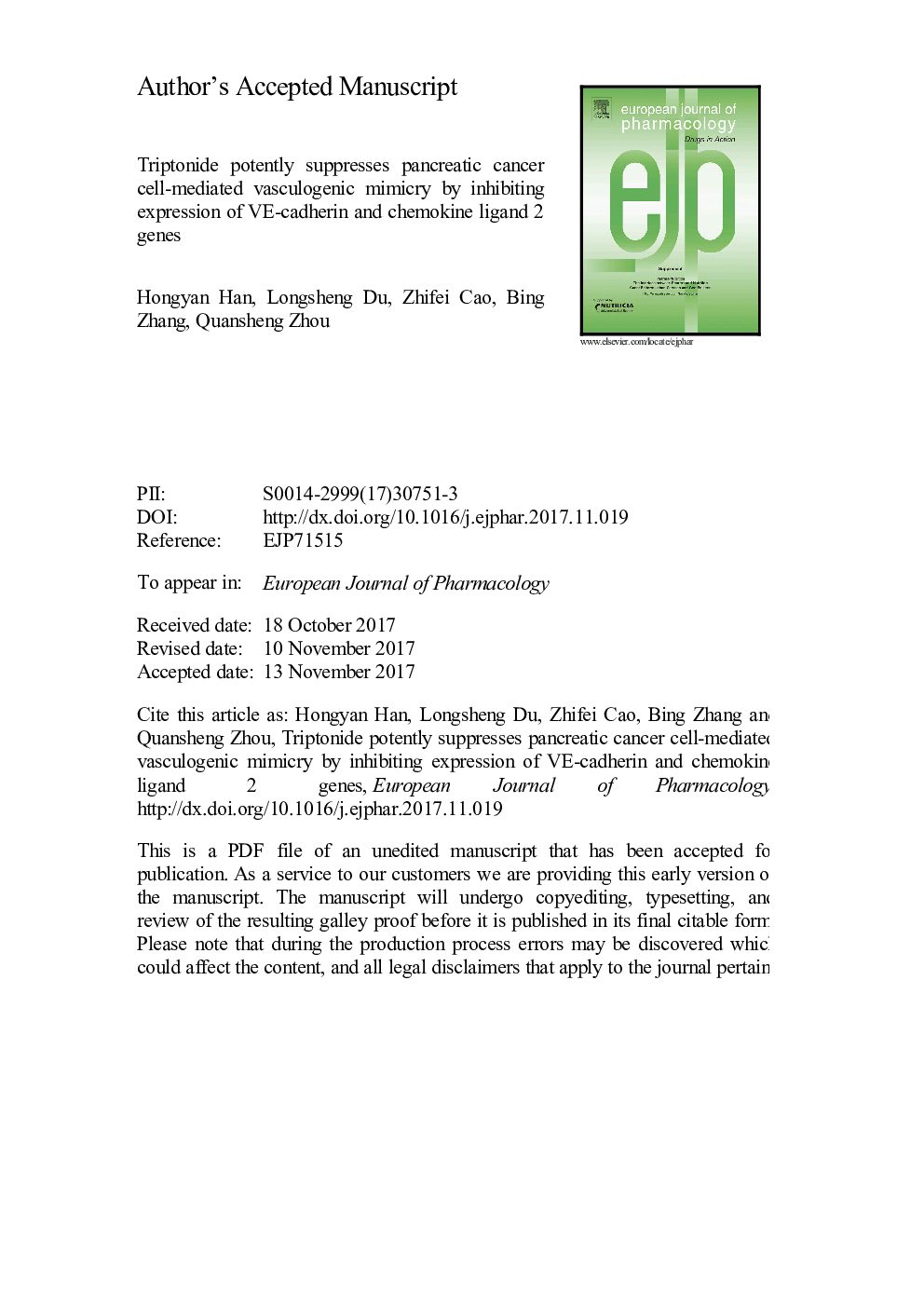| کد مقاله | کد نشریه | سال انتشار | مقاله انگلیسی | نسخه تمام متن |
|---|---|---|---|---|
| 8529706 | 1558862 | 2018 | 43 صفحه PDF | دانلود رایگان |
عنوان انگلیسی مقاله ISI
Triptonide potently suppresses pancreatic cancer cell-mediated vasculogenic mimicry by inhibiting expression of VE-cadherin and chemokine ligand 2 genes
ترجمه فارسی عنوان
ترپتونید به شدت از سرکوب سلول های سرطانی لوزالمعده به واسطه انعقاد ویروس کادرگین و لیگاند شیمیایی 2 ژن ها جلوگیری می کند
دانلود مقاله + سفارش ترجمه
دانلود مقاله ISI انگلیسی
رایگان برای ایرانیان
کلمات کلیدی
موضوعات مرتبط
علوم زیستی و بیوفناوری
علم عصب شناسی
علوم اعصاب سلولی و مولکولی
چکیده انگلیسی
Various aggressive cancers, including pancreatic cancer, produce functional blood vessels by neovascularization. Tumor vasculogenic mimicry (VM) promotes cancer progression and is closely associated with the poor prognosis of the cancer patients. Therefore, tumor VM is a sensible target for novel anti-cancer drug discovery. However, there is a lack of effective anti-tumor VM drugs in the clinical setting. In this study, we aim to explore novel agents to effectually inhibit pancreatic cancer cell-mediated tumor VM for anti-cancer therapy. Pancreatic cancer cell lines Patu8988 and Panc1 were utilized as a model. A mouse model was used for in vitro capillary-like structure formation and in vivo Matrigel plug assays to evaluate the anti-tumor VM efficacy of a small molecule triptonide from traditional Chinese herbs. Various methods, including RT-PCR, immunohistochemical staining, and the luciferase gene transcription reporter system, were applied to study the mechanisms of triptonide-exerted anti-tumor VM. Triptonide effectively inhibited pancreatic cancer cell-formed capillary-like structures in vitro and blood vessels in vivo through suppressing pancreatic cancer cell migration, invasion, and VM via inhibiting expression of tumor VM master gene VE-cadherin and pro-migratory gene chemokine C-X-C motif ligand 2 (CXCL2), mainly via reduction of gene promoter activity. Triptonide potently suppresses pancreatic cancer cell-mediated VM by reducing tumor cell migration and invasion and inhibiting expression of VE-cadherin and CXCL2 genes. Our results provide a novel and potent anti-tumor VM drug candidate for further development of effective anti-pancreatic cancer therapy.
ناشر
Database: Elsevier - ScienceDirect (ساینس دایرکت)
Journal: European Journal of Pharmacology - Volume 818, 5 January 2018, Pages 593-603
Journal: European Journal of Pharmacology - Volume 818, 5 January 2018, Pages 593-603
نویسندگان
Hongyan Han, Longsheng Du, Zhifei Cao, Bin Zhang, Quansheng Zhou,
